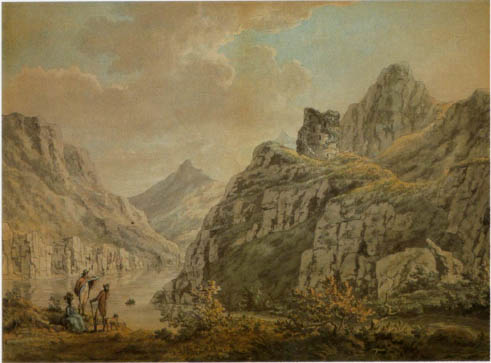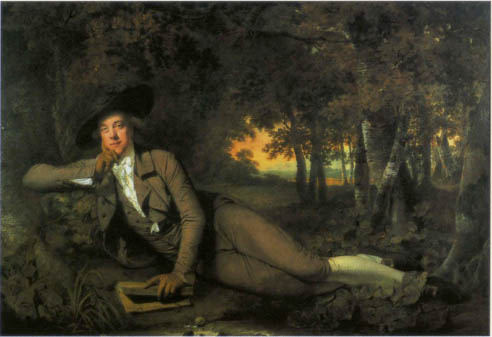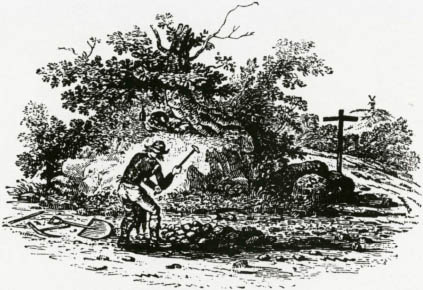A History of Britain, Volume 3 (74 page)
Read A History of Britain, Volume 3 Online
Authors: Simon Schama

The colouring of Britain exposes the disintegrationist argument for the pallid, defensive thing that it is. British history has not just been some sort of brutal mistake or conspiracy that has meant the steamrollering of Englishness over subject nations. It has been the shaking loose of peoples from their roots. A Jewish intellectual expressing impatience with the harping on ‘roots’ once told me that ‘trees have roots; Jews have legs’. The same could be said of Britons who have shared the fate of empire, whether in Bombay or Bolton, who have encountered each other in streets, front rooms, kitchens and bedrooms. Scots, like James Boswell, Thomas Carlyle or Charles Kennedy, have found their way in London; Welsh, like David Lloyd George, have done not half badly; as have Irish, like the Protestant George Bernard Shaw, who revelled in the fact that, like many Irishmen, he came from Yorkshire; and for that matter Jews from remote places such as Izmir in Turkey and Botosany in Romania, like my father, who donned a boater and blazer to cruise down the Thames with his nine-year-old son and recited passages from
The Wind in the Willows
(1908) and
Three Men in a Boat
(1889) while the putt-putt got stuck in the overhanging branches near Datchet.
Born and bred in him (for he himself was born in Whitechapel, not Botosany) was the sense that being British meant being a European, but also being something else too. Whether that something else extended Britain’s sense of place out west into the Atlantic or much further across the world, it was not something, even with the vanishing act of empire, to feel defensive about. Nor should it now. It is true that I argue this as a transatlantic Briton myself, but the increasing compulsion to make the choice that General de Gaulle imposed on us between our European and our extra-European identity seems to order an impoverishment of our culture. It is precisely the roving, unstable, complicated, migratory character of our history that ought to be seen as a gift for Europe. It is a past, after all, that uniquely in European history combines a passion for social justice with a tenacious attachment to bloody-minded liberty, a past designed to subvert, not reinforce, the streamlined authority of global bureaucracies and corporations. Our place at the European table ought to make room for that peculiarity or we should not bother showing up for dinner. What, after all, is the alternative? To surrender that ungainly,
eccentric
thing, British history, with all its warts and disfigurements, to the economic beauty parlour that is Brussels will mean a loss. But, properly smartened up, we will of course be fully entitled to the gold-card benefits of the inward-looking club of white restaurant-goers and villa-renters, bonded together by some imagined notion of cultural sophistication, whilst pretending not to notice that the washers-up in the kitchen just happen to come from Somalia, Algeria, Turkey and Sri Lanka. Nor should Britain rush towards a rebranded future that presupposes the shame-faced repudiation of the past. For our history is not the captivity of our future; it is, in fact, the condition of our maturity.
Two writers, busy scribbling away about the past in their own respective ways in the mid- and late 1940s, knew as much. Winston Churchill, risen from his post-election depression and his Riviera deckchair, had got back to his
History of the English-Speaking Peoples
. Even with all the research assistance at his disposal, Churchill couldn’t quite face taking the story beyond the beginning of his own life at the end of the 19th century. So the colossus of his last volume (written in the 1950s) was Abraham Lincoln, whom Churchill rightly regarded as the sublime common hero of the transatlantic community. At the same time, and although his last government notoriously resembled a reunion from the war, Churchill’s final crusade – against a nuclear arms race that would result in the annihilation of human civilization – was very much directed towards the future. But, as it had been throughout his life – in the imperial 1890s, in the anti-appeasement 1930s and now – Churchill’s history-writing, in this case the epic, as he understood it, of modern democracy, made his pleas to turn back from thermonuclear destruction the more urgent, the valediction more poignant: ‘The day may dawn’, he told the House of Commons in his last speech, in March 1955, introducing the defence white paper, ‘when fair play, love for one’s fellow-men, respect for justice and freedom, will enable tormented generations to march forth serene and triumphant from the hideous epoch in which we have to dwell. Meanwhile, never flinch, never weary, never despair.’
Five years earlier, on 21 January 1950, George Orwell had died in University College Hospital in London. His last published piece was a review of Churchill’s memoir
Their Finest Hour
(1949). One might have supposed that Orwell, so eagle-eyed when it came to exercises in self-justification, so suspicious of sentimental reminiscence, might have been wary of the book and its author. But not a bit of it. He paid Churchill the highest compliment he was capable of by writing that, although parts of the book seemed to be taken from an election address, his memoirs read ‘more like those of a human being than of a public figure’. There was, he thought,
‘a
certain largeness and geniality’, which made him rightly cherished by ordinary people, and the stories circulating about Churchill – like his adding to ‘we shall fight them on the beaches’ the words ‘we’ll throw bottles at the b—s, it’s about all we’ve got left’ – testified to that affection.
There is no doubt, too, that part of Orwell’s appreciation of Churchill the warrior derived from the naturalness with which the old man had assimilated British history almost involuntarily into his bones and blood. It may not have been Orwell’s kind of past, but it still made room for Wat Tyler and Cromwell and Cobbett as well as Elizabeth I and Disraeli. And Orwell was the one who thought that, in any future Britain, the past should be unapologetically woven through its society; that the lion and the unicorn should still, as he wrote, appear on uniform buttons.
Orwell’s sense that for all his aristocratic Toryism (and for many years Orwell had described himself as ‘a Tory anarchist’) Churchill was part of the world of the ordinary man was embodied in his decision to call his ‘Last Man in Europe’ Winston Smith.
Nineteen Eighty-Four
, his imperishable masterpiece, published in 1949, is usually remembered as a nightmare vision of the doublespeak future, in which the tyranny of Big Brother presides over a grimly homogenized state in which War is Peace and Lies are Truth. Most of it was written when the widowed Orwell was staying in a cottage lent to him by the newspaper proprietor David Astor on the island of Jura, on the very rim of the Hebrides: population about 300; post once a week, maybe; no telephones, no electricity. The TB that would kill him was getting much worse but he typed away, sometimes with the machine on his knees, and had his adopted son, Richard, with him as well as his sister Avril, who after the nanny had left, looked after them both. Although Barnhill Cottage is impossibly remote, Orwell was not lonely. Friends came and went if they could brave the odyssey of getting there. Orwell had just wanted to get away from the static, everyday hum of politics and the London literary life to concentrate his mind on what was most important to him: the fate of freedom in the age of the super-power and the super-corporation, which are hybridized in the brutal monstrosity of Big Brother’s regime, the Party.
Until one reads the book as the English novel it is, rather than as an extended lecture on the abuses of power, it is easy to overlook that up there in Jura, among the eagles and the red deer and the sea otters, Orwell was also penning one of the most impassioned arguments for the indispensability of history. History and memory are not the antithesis to free will, but the condition of it. When O’Brien, the arch-deceiver who has persuaded Winston Smith that he is running a resistance group, suggests sealing his recruitment with a toast to the future, Winston lifts his glass and
drinks
instead ‘“To the past.” “The past is more important,” agreed O’Brien gravely.’ And, of course, for the reason that history is the enemy of tyranny, oblivion is its greatest accomplice. By encouraging forgetfulness, the Party became free to impose on its hapless subjects its own version of whatever past it chose. Winston’s lover, Julia, had ‘no memories of anything before the early sixties’. But, somehow, memory was not quite obliterated from Winston’s consciousness. How else to explain his strong sense of revulsion, unless through a sense that things had not always been as they were in the present? And then the past starts to come back. An old prole remembers, illicitly, that the beer used to be better. In a junk shop he buys a glass paperweight, at least a century old, with a piece of coral encased inside it; kept in his pocket, this becomes the trigger of memory, the talisman of imaginative freedom. Euphoric at the recovery of time, he is reckless enough to denounce the revolution and the Party for destroying all archives: ‘History has stopped. Nothing exists except an endless present in which the Party is always right.’
Nothing could be more British – all right, more English – than for George Orwell to insist that to have a future, a free future at any rate, presupposes keeping faith with the past. Only one thing mattered more to him, and that was nature. Winston Smith does not have time for, nor access to, the archives that would allow him to imagine the alternative outcomes embedded in past time. But he does dream, not unlike those earlier sometime radicals Wordsworth and Coleridge, of a ‘Golden Country’. In his dream, ‘It was an old, rabbit-bitten pasture, with a foot-track wandering across it and a molehill here and there. In the ragged hedge on the opposite side the boughs of the elm trees were swaying very faintly in the breeze, their leaves stirring in dense masses like women’s hair. Somewhere near at hand, though out of sight, there was a clear, slow-moving stream where dace were swimming in the pools under the willow trees.’ And of course there is, because in Orwell’s fugitive Golden Country nature, love, freedom and history are all ravelled up together. Some before him called such a place of hopes and blessings ‘Jerusalem’. And some of us, obstinately, think we can still call it Britain.

Sheelins in Jura and a Distant View of the Paps
, by Moses Griffiths, from
A Tour in Scotland
(1772) by Thomas Pennant.

Dolbadarn Castle and Llanberris Lake
, by Paul Sandby,
c
. 1770.

Sir Brooke Boothby
, by Joseph Wright of Derby, 1781.

Wood engraving by Thomas Bewick from his
History of British Birds
(1804), showing the life of ordinary people. By the stony roadside, a man breaks rocks.